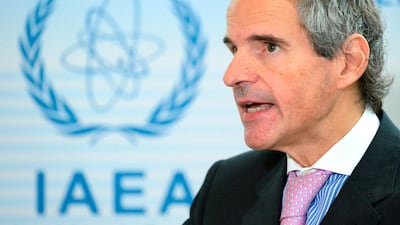Iran does not have enough enough enriched uranium to make a nuclear bomb under the UN atomic watchdog’s official definition, the agency’s head said.
"The Iranians continue to enrich uranium, and to a much higher degree than they have committed themselves to. And this amount is growing by the month," International Atomic Energy Agency (IAEA) head Rafael Grossi told Austrian newspaper Die Presse on Saturday.
The IAEA is based in the Austrian capital, Vienna.
Asked about how long Iran would need to build a nuclear weapon, Mr Grossi said: “In the IAEA we do not talk about breakout time. We look at the significant quantity, the minimum amount of enriched uranium or plutonium needed to make an atomic bomb. Iran does not have this significant quantity at the moment.”
Iran denies ever having had a nuclear weapons programme, saying its nuclear programme is purely for energy purposes.
The IAEA defines “significant quantity” as the approximate amount of nuclear material for which the possibility of manufacturing a nuclear explosive device cannot be excluded.
The most recent quarterly IAEA report on Iran last month said it had 2,105.4 kilograms of enriched uranium, far above the 202.8kg limit in a 2015 deal with global powers but a fraction of the enriched uranium it had before the accord. The US pulled out of the agreement in 2018.
It is also enriching to up to 4.5 per cent purity, far below the 20 per cent it achieved before the deal and the 90 per cent that is considered weapons grade.
This month, Mr Grossi said that the IAEA carried out more than 400 inspections on Iran last year.
Asked whether the Joint Comprehensive Plan Of Action, the official name for the 2105 nuclear deal, is dead or not, the IAEA chief said it was “very much alive to the countries adhering to it”, namely Britain, China, France, Germany and Russia.

